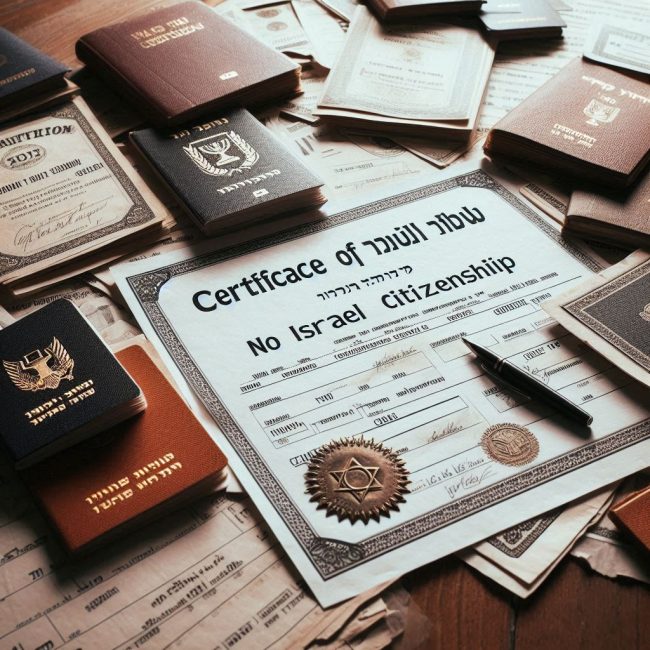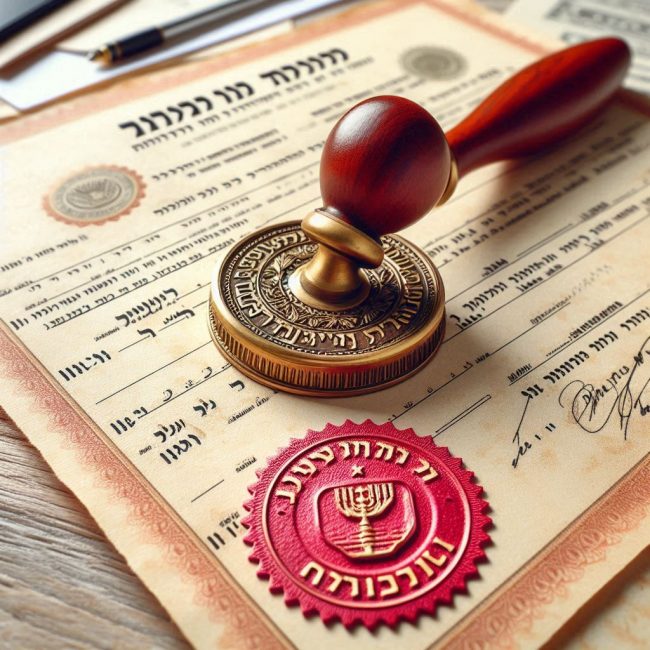Cancellation / Closure of ‘Procedure for obtaining status in Israel by a foreign spouse’
1. Closure of step-by-step procedure for family unification in Israel without deportation
2. Closure of a step-by-step procedure for family unification in Israel without divorce
3. Closure of step-by-step procedure for family unification in Israel with the right of subsequent entry into Israel
4. Closure of the step-by-step procedure for unilateral family unification in Israel
5. Closure of step-by-step procedure for family unification in Israel when the husband/wife is not in Israel
6. Closure of the staggered family unification procedure in Israel and the abolition of the marriage contract (eskem mamon).
7. Closure of the step-by-step procedure for family unification in Israel by consent of the parties
8. Entering Israel after the closure of the staggered family unification procedure in Israel
9. Cancellation of the staggered family unification procedure in Israel
10. Divorce in Israel after the closure of the staggered family unification procedure in Israel
11. Israeli humanitarian visa (Maamad Humanitari) after the closure of the step-by-step procedure for family unification
12. Temporary refugee status after the closure of the step-by-step procedure for family unification

WHAT’S THE PROCEDURE FOR OBTAINING STATUS IN ISRAEL BY A FOREIGN SPOUSE
The step-by-step procedure of family unification in Israel or, as it is called in Hebrew, AHMASH (ikhud mishpachot) is today the main and practically the only legal channel of immigration to Israel for those who do not have Jewish roots or those who for various reasons are unable to prove their Jewishness.
Tens of thousands of citizens of Russia, Ukraine, Belarus, Georgia, Uzbekistan, Kazakhstan and other countries of the former Soviet Union have obtained Israeli citizenship and a passport (darqon) through marriage or actual family relations (yaduim be-tzibur) with an Israeli citizen or citizen after successfully completing the lengthy step-by-step procedure of family unification.
It takes a minimum of 5 years to obtain Israeli citizenship under the step-by-step procedure of family unification, but unfortunately not every mixed marriage in Israel stands the test of time. Some couples break up during the procedure process before it is finalized, and even when the spouses separate peacefully and amicably, any suspension or termination of the procedure creates a number of legal issues that require a legal or administrative solution, some of which require the mandatory involvement of an Israeli lawyer or notary, or even an Israeli court: dissolution of marriage in Israel (divorce in Israel), annulment of the marriage contract (haskem mamon), division of joint property acquired in Israel, closure of cases
Our office has been handling all immigration matters in Israel for over 20 years and can help legally resolve all legal issues in Israel related to the closure of step-by-step procedure of family unification.
Of course, we are not the only attorneys in Israel dealing with Israeli immigration law, and besides us there are other licensed attorneys in Israel, dealing with Israeli Ministry of the Interior (Misrad Apnim) and the step-by-step procedure of family unification, who will also be able to provide you with quality legal services in Israel, after the closure of the procedure.
The most important thing in the matter of Cancellation / Closure of the step-by-step procedure of family unification – beware of scammers and various dubious “firms” illegally offering assistance with the Israeli Ministry of the Interior (Misrad Apnim) and legal services in Israel. Remember: any legal activity in Israel without a license is strictly prohibited, and hapless clients of illegal law offices in Israel may face criminal liability and deportation from Israel.

PROCEDURE, DOCUMENTS, REGISTRATION
The step-by-step procedure for the legalization of a foreign spouse in Israel is the process by which the foreign spouse of an Israeli citizen or permanent resident is granted the right of residence and ultimately citizenship in Israel. The process is step-by-step and involves several key steps, each of which requires certain conditions to be met and documents to be submitted.
It is important to remember that under Israeli law, a spouse in the context of the procedure is not only a citizen who is officially married, but also a civil partner (husband or wife), as well as persons living in same-sex marriages and other partnerships.
As part of the legalization procedure, a spouse can be called from abroad or the legalization procedure can be initiated for a partner who is already in Israel.
It is also possible to initiate the procedure without summoning your spouse or partner from abroad, provided that he or she is already legally in Israel.
It is worth remembering that legalization is possible even if the spouse has expired tourist visa B. But in this case you will need the help of a lawyer.
1. Why do you need a step-by-step legalization procedure?
Israel, like many other countries, has strict immigration and citizenship laws. A step-by-step legalization procedure helps ensure that a marriage between an Israeli citizen and a foreigner is genuine and not a sham. This protects the country from abuse and ensures that the new residents are integrated into society. Keep in mind that a marriage certificate does not automatically recognize a marriage. The authorities need to prove that the so-called “center of life” of your family is moving from abroad to Israel. Sometimes it may be necessary to prove that the “center of life” is in the specific city where you live.
2. Main stages of legalization
The legalization process is divided into several stages:
Stage One: Provisional status
Document preparation: The Israeli citizen spouse and the foreign spouse submit a joint application to the Israeli Ministry of Interior (MOI). The required documents include a marriage certificate (if the document was issued outside of Israel, the certificate must be submitted with an apostille), passports, photographs, proof of cohabitation, and other supporting documents.
Submission of documents (electronically)
Application for Entry Permit for Spouse: If the marriage is between an Israeli citizen and a foreign spouse abroad, an application must be submitted to the Ministry of Interior requesting that the spouse be granted an entry permit. This also applies to children from the first marriage, if they intend to move to Israel with their parent.
Initial verification: The Ministry of Internal Affairs conducts a document check and calls for an interview to verify the authenticity of the marriage. The interview may include questions about personal life, joint plans, etc. The MIA may also request a number of additional documents
Obtaining a B/1 visa: If everything is in order, the foreign spouse is granted a B/1 temporary work visa, which allows him/her to legally live and work in Israel for one year. Each year the status is renewed upon submission of proof of “center of life” and proof of continued ties.
Stage Two: Temporary residence permit
Extension of status: Depending on whether the marriage is official or civil, the foreign spouse is granted a residence permit from one year to 3 years. Before obtaining a residence permit, a mandatory interview is conducted and, if there are no discrepancies, a residence permit is issued for 1 year with the need to renew every year.
A/5 residence permit: If all conditions are met, the foreign spouse is granted a temporary residence permit (A/5) for one year. This residence permit allows the spouse to work and use health services.
Annual renewal: The A/5 residence permit is renewed annually for four years.
Stage Three: Permanent Residence Permit – Citizenship
Depending on the type of marriage, after 4 years in A/5 status you can apply for a permanent residence permit – citizenship. At the same time it is necessary to pass an interview and submit the necessary documents about the “center of life” and cohabitation.
3. Difficulties and challenges
The legalization process can be complex and involve many bureaucratic procedures. Possible problems include:
Bureaucracy: All documents require a stamp and apostille in the country where the foreign spouse has citizenship.
Interview: Some couples find interviews stressful because the questions can be personal and detailed.
Proof of marriage authenticity: It is not always easy to provide convincing evidence of cohabitation and a real relationship, especially if the couple lived apart before marriage.
Renewal status: Annual inspections and renewals can be worrisome and time-consuming and resource-intensive.
Refusals: If there is insufficient evidence or suspicion of a sham marriage, the Ministry may refuse to extend the status or grant PML-citizenship, leading to the need to appeal decisions in court.
4. Practical tips
It is important to successfully complete the step-by-step legalization process:
Collect and keep documents: Keep all documents that prove cohabitation and relationship (bills, photos, letters, etc.).
Update your information regularly: Report changes in address, work, and other important aspects of life to the MIA.
Studying Hebrew: Knowledge of the language will help with interviews and integration into the community.
Legal advice: In complex cases, consult an attorney specializing in immigration law.
Psychological support: The process can be stressful, so it is important to support each other and seek psychological support if necessary.

5. Conclusion
The step-by-step procedure for legalizing a foreign spouse in Israel is a carefully organized and thoughtful process designed to ensure the authenticity of marriages and the successful integration of new residents into Israeli society. Although the process can be long and complicated, careful preparation, attention to detail and support for each other will help you successfully complete all steps and achieve Israeli citizenship.
For our part, we give one piece of advice: be sure to contact an experienced attorney in civil cases, (specializing in cases of foreign nationals and the status of spouses).
Why is this so important?
A good civil attorney in Israel will help you understand the documents in the Cancellation / Closure of the procedure (because the procedure requires a large number of documents and only a professional will help to collect and properly execute all the necessary papers).
He or she will also help you through the interview (interviews can be difficult and contain personal questions, the lawyer will prepare for them and advise you on how best to answer).
Avoid mistakes (the slightest errors can lead to failure or delays).
Appeal the decision (in case of refusal the lawyer will be able to prepare an appeal and defend your interests in court)





